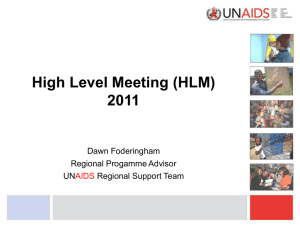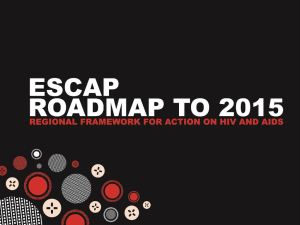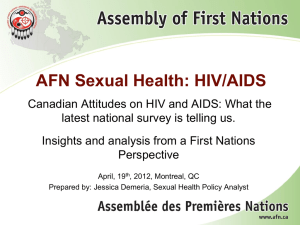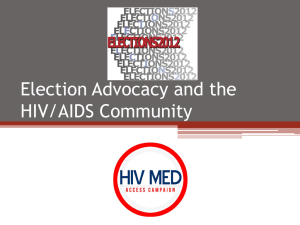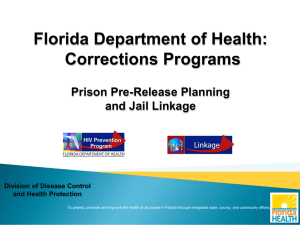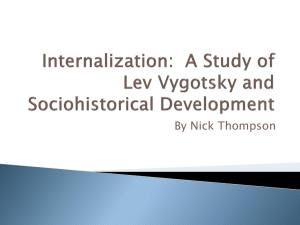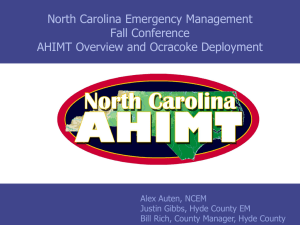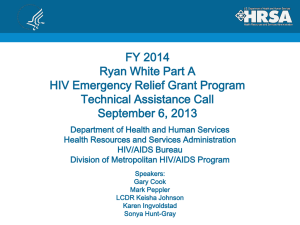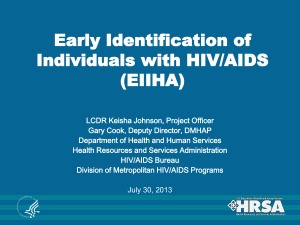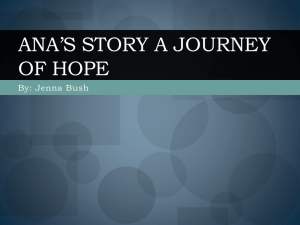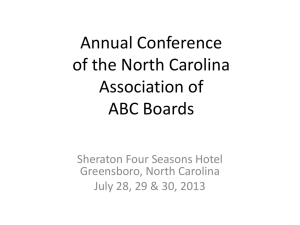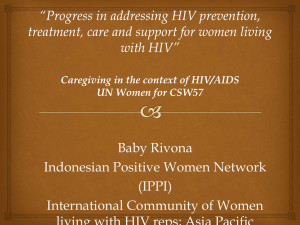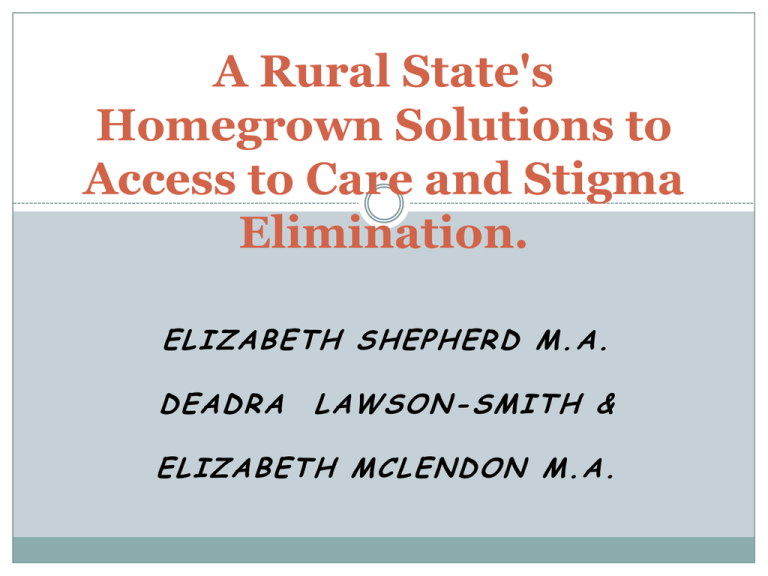
A Rural State's
Homegrown Solutions to
Access to Care and Stigma
Elimination.
ELIZABETH SHEPHERD M.A.
DEADRA
LAWSON -SMITH &
ELIZABETH MCLENDON M.A.
South Carolina
South Carolina ranks number 1 among 50
states in heterosexual HIV transmission.
South Carolina ranks 10 among 50 states in
AIDS cases.
7th among the largest cities is Columbia
African Americans are nearly 7 times more likely to be
impacted with HIV disease and 8 times more likely to
be impacted by syphilis than white persons.
There are more than 4,200 women in South Carolina living with
HIV/AIDS.
•
African American women in South Carolina account for an
estimated 83% of new HIV infections among all women in the
state..
Black women make up 17% of South Carolina’s total
population, but they are 26% of all persons living with
HIV/AIDS and 29% of all persons diagnosed with HIV-only in
the state
As of December 2007, South Carolina ranked among the top
states with the highest annual case rates for AIDS (8th),
Chlamydia (4th), and Gonorrhea (4th). African Americans
comprise 30% of the states population, but 73% of all cases of
HIV/AIDS in South Carolina.
South Carolina ranks 3rd in the nation for the proportion of
Persons Living with AIDS who are African American.
DHEC Region ADAP
Update Numbers
Region
2=108
Region 3=
224
Region
1=53
Region
5=72
Region
8= 31-
Region 6
= 51
Region 7=
93
South Carolina ADAP
Previous ADAP Waitlist April 2006
Enrolled 209 clients in September 2010 w/ 1 time
federal funding of $1.5 mil.
ADAP waitlist has approx. doubled since February
when it was 389 and last week it was 790
Funding Shortfalls
SC ADAP state funding trend
2005 - $500,000
2006 - $800,000
2007 - $4,500,000
2008 - $5,900,000
2009 - $4,600,000
2010 - $1,870,000
Funding Continued
SC is potentially facing a budget gap of $10 million in 2011
assuming level federal and state funding from last year.
SC will need an additional $10 million on top of the $1.87
million to remove folks off the waitlist for a period of one
year.
Funding required = 2,600 * $1000 * 12 = $31.2 million.
Promoting Statewide Waiver
South Carolina needs to apply for the state waiver
States can apply for the §1115 waiver from Center for
Medicaid and Medicare to expand eligibility to
individuals living with HIV.
Under the §1115 waiver every state dollar would
leverage $4 in federal funding for comprehensive care
to enable HIV + individuals to remain in the
workforce.
Most importantly §1115 waiver are identified as
priority in the new National HIV/AIDS Strategy
Implementation Plan to secure comprehensive
healthcare for individuals living with HIV prior to
2014
SHARP: State Summary. www.taepusa.org
End Geographic Disparities
End Geographic disparities in access to
transportation. Lack of transportation in SC rural
areas is the barrier of all barriers to healthcare
30% of South Carolina is rural transportation
SC invests ZERO Dollars for in HIV/AIDS
Prevention
Improving the Response
Increase testing, linkage to care, and treatment adherence by
combating HIV-related stigma.
Stigma is a major barrier and challenge in rural South
Carolina
To address this barrier:
Enforce South Carolina law and pursue federal funding
and state funds to support comprehensive health
education .
Since the enactment of the Comprehensive Health
Education School Act in 1988 it has been very lax, most
middle and high schools do not teach sex education or
HIV/AIDS education addressing stigma and medically
updated HIV/STD information.
SHARP: State Summary. www.taepusa.org
South Carolina Action Plan
Objective A.1: By January 2011, the SCHACCTF
will have accurate state materials prepared, based on
research, to use for advocacy activities related to
ADAP funding.
By February 2012, the SCHACCTF members will
complete at least two (2) local community interface
and three (3) targeted and coordinated state-level
advocacy approaches to key committee leaders in the
SC Legislature from their geographical areas to
petition support for ADAP funding/HIV prevention
in every area of the state through the end of this
Session.
South Carolina Action Plan
Objective A.3: During FY 2011 and 2012,
SCHACCTF will utilize the multi-faceted (e.g, media,
community mobilization, social networks,
consumers, etc) approach to keep the legislature and
the general public aware of Task Force advocacy
efforts and the need for ADAP, HIV/AIDS
prevention, and Medicaid funding.
The S.C.H.A.C.C.T.F. will work to enhance state HIV
prevention funding for S.C.
South Carolina Action Plan
Goal C: The S.C.H.A.C.C.T.F. will work to maintain or
increase Medicaid funding in S.C., which could improve
reimbursement rates to retain and recruit HIV and other
health care providers expand eligibility for non-disabled, HIV
positive individuals, and prepare SC for increased eligibility
requirements with Healthcare Reform.
C-1 By February 2011, the Task Force will maintain an ongoing priority of identifying new partners willing to join
efforts with other stakeholders to improve access to and
strengthen Medicaid and willing to incorporate HIV/AIDS
advocacy into their agendas.
More Goals for Action
Goal D: The S.C.H.A.C.C.T.F. will establish a
national voice for policy & advocacy for South
Carolina.
Goal E: Establish and link local community
advocacy networks within and throughout fourteen
(14) P.O.S.I.T.I.V.E. Voices (PV) counties (Richland,
Sumter Clarendon, Greenville, Anderson, Pickens,
Charleston, Orangeburg, Bamberg, Lexington,
Hampton, Colleton, Jasper and Beaufort)
Action
Objective E.2 By February 2012, enhance media
exposure of PV HIV+ Women’s Health Advocacy
Network throughout the state of South Carolina.
Next Advocacy Steps
South Carolina is a Southern State with a long tradition of
Health Disparities in the context of slave labor diseases were not
acquired but brought to us by the slave ships on the voyage
from Africa to America.
South Carolina has made poverty its home not an issue to tackle
SC has an idea that class is coupled with poverty, race, and
culture
SC people have a lack of empathy
SC has a serious epidemic of Homophobia
Meet Jimmie
South Carolina Waitlist Man
struggles for work and life
and still empowers others
Deadra Lawson-Smith,
Coordinator
P.O.S.I.T.I.V.E. Voices
South Carolina HIV/AIDS
Council
1115 Calhoun Street
Columbia, South Carolina
•
•
•
South Carolina as number one (1) in the nation in heterosexual
transmission (Kaiser Foundation, 2009).
•
Heterosexual transmission was the most common reported
risk for all women and girls with over ninety percent of women
contracting HIV from her male partner (South Carolina
Department of Health, 2007).
Eight (8) out of ten (10) children infected with HIV in South
Carolina born to Black mothers (SCDHEC, 2007).
•Censorship of information, poverty, racism, and religious
dogma compound efforts to intervene with sexually active
women, youth, and higher risk populations that reside in
our predominately rural and politically conservative
community.
•Systemic prejudices and apathy fuel HIV/AIDS stigma and
exacerbate barriers within our already oppressed rural
counties.
Examples of such barriers include:
•
fear of knowing one’s HIV status,
•
lack of access to help in small communities,
•
•
managing local small-town “gossip,”
lack of adequate transportation which
access to HIV/AIDS health
care.
impacts
WHAT IS POSITIVE VOICES?
OUR NETWORK
HIV+ Women who are ready,
willing and able to raise
awareness of the impact that
HIV/AIDS
poses
on
individuals, communities and
society.
WHAT IS POSITIVE VOICES?
Our Role and Responsibilities
• Leadership skills building training
• Advocacy Training
• Local resource guide development
• Public Speaking- (media, community & faith-based events)
• Creation of Legislative Advocacy Tool
• Production of Public Service Announcements
WHAT IS POSITIVE VOICES?
GEOGRAPHICAL REPRESENTATION
BEAUFORT
GREENVILLE
CHARLESTON
ORANGEBURG
LEXINGTON
RICHLAND
SUMTER
P.O.S.I.T.I.V.E VOICES
PARTNERS
SOUTH CAROLINA HIV/AIDS COUNCIL
SC HIV/AIDS CARE CRISIS TASK FORCE
SOUTHERN REACH-(AIDS UNITED)
TIBOTEC THERAPEUTICS
P.O.S.I.T.I.V.E. VOICES
ACCOMPLISHMENTS
Participated in Congressional Town Hall in Collaboration with the SC
HIV/AIDS CARE CRISIS TASK FORCE with Congressman James E.
Clyburn (August 18, 2009);
Participated in SC HIV/AIDS CARE CRISIS TASK FORCE strategic
planning meeting (August 19-20, 2009);
Participated in community-level focus group with the Harvard Legal
10-26-2009, as part of an up-coming state-wide HIV/AIDS prevention,
treatment, and care assessment scheduled for FY 2010.
Participated in Town Hall Discussion in Collaboration with National
Office of AIDS Policy with AIDS Czar Jeff Crowley (October 26, 2009);
OTHER RECENT
ACCOMPLISHMENTS
•Completed Leadership Training(2 classes)
•Completed “WE BELIEVE” Advocacy Tool for
distribution to SC Legislators and Facilitating
Community Level Workshops
•PV Women are currently participating in Public
Speaking Engagements (faith-based and community) radio
television shows, and newspaper articles
OTHER RECENT
ACCOMPLISHMENTS
•Completed Logo Development
•Received additional funding from Southern
Reach to further P.O.S.I.T.I.V.E. Voices
(National AIDS Fund)
•Received funding from LINCC to develop an
Empowerment Academy for HIV+ women
living in South Carolina and devolpment of
Public Service Announcements(Tibotec
Therapeutics)
CONTACT US:
803-254-6644
Empowerment
HIV Patient Comes Forward To Help Others
HIV and AIDS, there is a stigma around it. Some
people do not like talking about it, but it's an
epidemic effecting many right here in the Midlands.
http://www.wltx.com/video/default.aspx?bctid=1012176036001
The South Carolina
HIV/AIDS Care Crisis Task
Force
32
EMPOWERING THE
ENERGY
FOCUSING THE FIRE
The Ruby Slippers
33
The Story of the Ruby Slippers in L. Frank Baum’s
book, The Wizard of Oz.
Their Significance to the HIV-infected and affected,
plus the community at large
The “All-Powerful Man Behind the Curtain.”
The South Carolina HIV/AIDS Care Crisis Task
Force
34
A Brief History
“Yes, we can!”
and
“Yes, we have!”
The South Carolina HIV/AIDS Care Crisis
Task Force
35
Overview
Formed in 2006 in response to South Carolina’s
First ADAP Wait List.
Funded primarily by AIDS United (formerly the
National AIDS Fund)
Inconsistent and unstable funding continues to
fuel South Carolina’s SECOND Wait List as the
health of citizens unable to access life-saving
medications threatens our state’s economic
stability.
The South Carolina HIV/AIDS Care Crisis Task
Force
36
Mission
The South Carolina HIV/AIDS Care Crisis Task
Force is a non-partisan advocacy coalition of
individuals, non-profit organizations, and allies from
across South Carolina committed to improving the
response to the HIV/AIDS epidemic in our state.
The South Carolina HIV/AIDS Care Crisis Task Force
Goals and37Objectives
Our principal goal is to advocate for the preservation, expansion and
strengthening of HIV prevention, care, treatment, support and
education services in South Carolina, as well as, the advancement of
civil and human rights for people affected by HIV/AIDS. We pursue
our goals by working on the following objectives:
o
o
o
o
o
o
o
Determine annual policy priorities
monitoring and influencing public policy
develop and implement advocacy plans
raise public visibility for HIV/AIDS issues in South Carolina
educate elected and appointed officials, key decision makers, the general
public, and Task Force members about needed HIV/AIDS public policy
conduct at least an annual legislative action event at the State Capitol
develop and implement plans to increase Task Force membership that is
diverse in
geographic location and perspective and is representative of
people living with HIV/AIDS.
The South Carolina HIV/AIDS Care Crisis Task Force
schacctf@gmail.com
Statewide Participation
38
All AIDS Service Organizations (ASOs) statewide
except one regularly participate in Task Force
activities.
The two major hospital systems with Ryan White
Clinics actively participate.
Non-Traditional Partners include the SC Hospital
Association, SC NAMI, SC Campaign to Prevent
Teen Pregnancy, members of Richland County
Council and Sumter City and County Councils,
Harvard Law School, faith groups, and many
others.
Task Force
schacctf@gmail.com
Structural Overview
39
Membership – currently 305 and growing…
o
o
o
Individuals
Groups
Agencies/Organizations
Committees
o
o
o
o
o
Communications
Consumer Action
Policy and Research
Legislative Strategy
Stakeholder Engagement
Administrative
o
o
Chair and Executive Committee
Advocacy Liaison
Relationship with key Legislative ally,
SC State Representative
Joseph Neal
40
“Show Your Face in this Place” National Volunteer Week
Appreciation Event
Rep. Joe Neal with members of the Masjid As-Salaam Project
F.A.I.T.H. AIDS Care Team and Staff and Volunteers of SC
41 Council
HIV/AIDS
State House, Columbia, SC • April 23, 2009
Saving the Next Generation
Statewide Community Action Town Hall Meeting
42 James E. Clyburn
with SC Congressman
Columbia, SC • August 18, 2009
Saving the Next Generation
Statewide Community Action Town Hall Meeting
with SC Congressman James E. Clyburn
43
and the Women of P.O.S.I.T.I.V.E.
Voices
Columbia, SC • August 18, 2009
Saving the Next Generation
Statewide Community Action Town Hall Meeting
with SC Congressman James E. Clyburn
Deadra Lawson-Smith, Coordinator,
P.O.S.I.T.I.V.E. Voices
44
Columbia, SC • August 18, 2009
White House Office of National AIDS Policy
SC Town Hall Meeting with Jeffrey S. Crowley, Director
Columbia, SC • October 26, 2009
45
White House Office of National AIDS Policy
SC Town Hall Meeting with Jeffrey S. Crowley, Director
46
Columbia, SC • October
26, 2009
White House Office of National AIDS Policy
SC/NC Town Hall Meeting with Jeffrey S. Crowley, Director
Washington, NC • October 26, 2009
47
International Influence
Congressional Delegation from Ghana invited by Rep. Joe Neal and
Mildred Vanderpuije, Daughter of Mayor of Accra, Niece of Ghanaian
President and volunteer at SC HIV/AIDS Council with Dr. Bambi Gaddist,
SCHAC’s Executive Director
Columbia, SC 48
• April 27, 2010
Rally to Save ADAP and HIV Prevention in SC
State House, Columbia, SC • March 17, 2010
49
Task Force Volunteers meeting Senator John Scott
Gressette Building, State House, Columbia, SC • March 23,
2010
50
Honoring Task Force Volunteers
National Volunteer Week 2010
by Rep. Joe Neal in House51Chamber (then Sen. Hugh
Leatherman in Senate Chamber)
State House, Columbia, SC • April 22, 2010
Legislative HIV/AIDS Update and Country Breakfast
Rep. Chip Limehouse (R-Charleston)
52
and Constituent, Virginia King, Low Country AIDS Access
Blatt Building, State House, Columbia, SC • May 13, 2010
Stephanie Williams’ Memorial Rally for Life
Mrs. Ione Dwyer, Sumter City Council
State House, Columbia, SC • May 25, 2010
53
Stephanie Williams’ Memorial Rally for Life
Elizabeth Shepherd, Advocate
State House, Columbia, SC • May 25, 2010
54
Stephanie Williams’ Memorial Rally for Life
Shirley Brown, Advocate and 17-Year HIV Survivor
State House, Columbia, SC • May 25, 2010
55
Introduction of National AIDS Policy
Press Conference and Reception
Task Force Chair, 56
Dr. Bambi Gaddist,
delivers 20 letters from statewide Consumers
White House • July 15, 2010
Task Force’s Strategic Planning Meeting
Dorothee Alsentzer, Sr. Clinical Fellow, and colleague from
the
57
Harvard Law School WilmerHale
Legal Services Center
Charleston, SC • August 31 & September 1, 2010
Task Force Monthly Meeting
Columbia, SC • December 14, 2010
58
University of SC’s MLK Day of Service
Students researching their legislators, then handwriting letters to
them about their concerns regarding HIV’s impact on 20-29 year
olds59
in SC
SC HIV/AIDS Council • Columbia, SC • January 17, 2011
Representative Christopher Hart
presenting at USC’s MLK Day of Service
SC HIV/AIDS Council, Columbia, SC • January 17, 2011
60
SHARP Report Release and Rally to Restore Funding for ADAP and
HIV Prevention
Representative Gilda Cobb-Hunter
61
State House, Columbia,
SC • February 9, 2011
SHARP Report Release and Rally to
Restore Funding for ADAP and HIV
Prevention
62
SC ETV interviewing Representative Bakari Sellers
State House Lobby, Columbia, SC • February 9, 2011
SC ETV Interview at Trinity Episcopal
Cathedral
Host of the SHARP Report and Rally Reception
63 Bolle, Acting Dean
The Very Rev. Stephen
Dorothee Alsentzer, Sr. Clinical Fellow, Harvard Law School WilmerHale
Legal Services Center
Columbia, SC • February 9, 2011
Rally for a Moral Budget
ADAP Banner on top tier of signs on steps
Shamira Jones in lower front left, Nursing Student, Midlands Technical College, and
64
Volunteer
State House, Columbia, SC • March 12, 2011
“Your Voice Matters” Advocacy Training
& “Visit Your Legislator”
with Joey Terrill, Domestic Advocacy
Manager, AIDS Healthcare
65
Foundation
Columbia, SC • March 29, 2011
“Visit Your Legislator”
Veronica Brisco, Newly Trained Advocate
Still Smiling after distressing incident with her Representative
66Advocacy Manager, AIDS
and Joey Terrill, Domestic
Healthcare Foundation
State House Lobby • Columbia, SC • March 29, 2011
Benedict College PLUS Day Advocacy
Training
67 by Ali Shabazz
Being “Fired Up”
Peer Health Navigator and 28-Year HIV Survivor
SC HIV/AIDS Council, Columbia, SC • April 2, 2011
Training
Researching their Legislators
SC HIV/AIDS Council, Columbia, SC • April 2, 2011
68
Benedict College PLUS Day Advocacy
Training
69
Writing their Legislators
SC HIV/AIDS Council, Columbia, SC • April 2, 2011
Debriefing after Visit to Sen. Jake Knotts
Julia Craft, RN, and Chris Davis, Retired Firefighter
with Volunteers Chaplain Camille Carpenter and Kojo DanquahDuah
70
SC HIV/AIDS Council • Columbia,
SC • April 26, 2011
“SC State House and Medicaid Update “
Karen Gillespie, Associate Director, State Governmental Affairs Bristolwith Ted Riley,
Myers Squibb
Attorney, and 71
Dr. Bambi
Gaddist, Task Force
Chair
Task Force Monthly Meeting • Columbia, SC • May 10, 2011
“Developing Local Advocacy Strategies in Response to National AIDS Strategy”
Patrick Packer, Executive Director, Southern AIDS Coalition
Monthly Task Force Meeting • Columbia, SC • June 14, 2011
72
Empowering Youth
Crystal Booker at work
Volunteer and Winthrop University Journalism Student
SC HIV/AIDS Council • Columbia,
SC • June 22, 2011
73
Faith Leaders Academy
with Metropolitan Interdenominational Church Technical
Assistance
Network
74
“Introducing Your Community Resources”
Cameron Brisco, 16-Year-Old Advocate for his mother, Veronica Brisco
Columbia, SC • June 24, 2011
In Conclusion
What the participants learned was an
overview of the South Carolina Care Crisis
Task Force, P.O.S.I.T.V.E Voices, Project
Faith and what shape the face of our funding
has upon the past, present, and future hopes.
From the data collected it appears to be a
bleak outlook for a newly positive individual
in South Carolina with HIV/AIDS.

